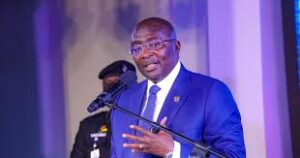BoG Welcomes Matilda Asante-Asiedu as New Second Deputy Governor

In a strategic move aimed at reinforcing leadership within Ghana’s financial regulatory framework, President John Mahama has appointed Matilda Asante-Asiedu as the Second Deputy Governor of the Bank of Ghana (BoG). The appointment was made in accordance with Section 17 of the Bank of Ghana Act, 2002 (Act 612), and reflects the administration’s intention to place experienced professionals at the helm of key financial institutions.
A formal statement issued by the Presidency and signed by Felix Kwakye Ofosu, Spokesperson to the President and Minister for Government Communications, announced the appointment. The statement praised Mrs. Asante-Asiedu’s strong academic and professional background, describing her as a seasoned expert whose appointment is expected to bring renewed insight and leadership to the central bank.
Mrs. Asante-Asiedu arrives at the BoG with a wealth of experience and a distinguished educational history. She earned an MBA in Marketing from GIMPA Business School in 2021, adding to a Master’s degree in Journalism Studies from Cardiff University in the United Kingdom, completed in 2005. Her foundational training in media and public communication includes a Diploma in Journalism from the Ghana Institute of Journalism (1997) and another in Politics and Public Affairs Reporting from the International Institute of Journalism in Berlin (2000).
Further strengthening her financial credentials, she recently attained certification as a Chartered Executive Banker from the Chartered Institute of Bankers, Ghana (CIB-Ghana) in 2024. This accomplishment reflects her continued commitment to professional development and excellence in banking.
Professionally, Mrs. Asante-Asiedu has made notable contributions to Ghana’s banking sector. She previously served as the Group Head of Retail Banking at Access Bank Ghana PLC, where she was instrumental in driving innovations and strengthening customer-focused banking strategies. Her leadership in the retail banking space has been widely recognized for boosting financial inclusion and introducing sustainable banking solutions.
In addition to her formal academic qualifications, Mrs. Asante-Asiedu has completed executive education programs at several world-renowned institutions. These include the Said Business School at Oxford University (2023), the Wharton School of the University of Pennsylvania (2015), and the Les Aspin Center for Government at Marquette University in Washington, D.C. (2003). These programs have equipped her with global perspectives on leadership, finance, and policy-making—skills that will be invaluable in her new role at the central bank.
Her appointment comes at a crucial time for Ghana’s economy, which is navigating a period of recovery and structural reform. The Bank of Ghana is currently engaged in efforts to stabilize the national currency, reduce inflation, and ensure resilience within the financial sector following global and domestic economic shocks.
Analysts believe Mrs. Asante-Asiedu’s deep understanding of the banking sector, combined with her exposure to both media and public affairs, positions her uniquely to support the central bank in meeting its policy goals. Her appointment is expected to add a pragmatic and innovative dimension to the leadership team, especially in strengthening public trust and enhancing stakeholder engagement.
As Second Deputy Governor, she will join the senior leadership of the Bank of Ghana in shaping monetary policy, supervising financial institutions, and ensuring macroeconomic stability. Her role will also likely involve supporting efforts to modernize banking infrastructure and champion inclusive financial services.
With her blend of strategic vision, hands-on industry experience, and commitment to institutional development, Matilda Asante-Asiedu’s appointment is being welcomed by stakeholders as a timely and impactful decision. It is seen as part of broader efforts to build a more resilient financial system capable of supporting sustainable economic growth and improving the lives of Ghanaians.






